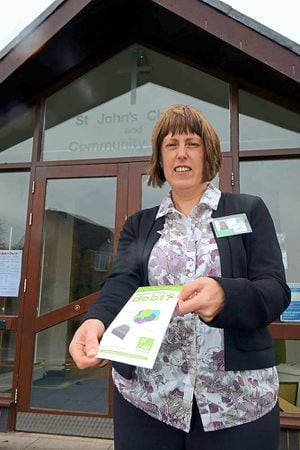Christmas debt advice: Save now to avoid a festive hangover, say Shropshire experts
We're little more than a week into autumn, but already talk is turning to Christmas. Restaurants are plugging their festive menus and speculation has begun about this year's Christmas adverts. As the old cliche goes, Christmas comes earlier each year.

Well, for thousands of families, Christmas has only just ended. Well at least paying for it has. New figures released by the Halifax reveal that the average family only finished off paying for last year's Christmas bill in April.
And a Shropshire debt advice centre is urging people to start planning for the festive season now, so they do not find themselves overwhelmed with debt once the festivities are over.
Jane Preston, who runs the Christians Against Poverty debt centre in Telford, says now is the time for people to start thinking about how they are going to start paying for their Christmas celebrations.

Decide how much you can afford to spend and stick to it
Collect supermarket loyalty points
Put a set amount of money aside weekly in a savings account
Join a Christmas club or collect supermarket savings stamps
If money is tight, share your concerns with your friends and family
If you know you need help with debts, would like to attend a Christians Against Poverty money or a lifeskills course, visit capuk.org or telephone 0800 328 0006
"It probably fills a few people with dread to think that Christmas is less than 90 days away, but this is actually a great time to stop and consider how you can help yourself between now and then," she says.
The Telford debt centre opened last November and has already helped many people manage their financial problems. In some cases, the charity has gone as far as taking on people's debts, managing their incomings and outgoings until the debt has been cleared.
But Mrs Preston says much of this heartache can be avoided if people start thinking now about how they are going to pay for the festivities.
"There's a lot of hype from marketing people about buying the perfect Christmas, which we know in our hearts isn't real life, but we all so easily get swept up in it," says Mrs Preston.
"Before all that hits our screens, now is the time to get together our own personalised plans for an enjoyable, stress-free celebration.
"There are loads of ways to get started – the main thing is setting yourself a target and deciding on your tactics. The last thing your family would want is to see you in financial trouble in 2017."
The figures from last year make for disturbing reading. In November 2015, borrowing on loans and credit cards soared to £1.5 billion, an 8.3 per cent surge over the course of the year – the highest increase since 2006, just before the financial crash.
According to the Halifax, the average person spent an average of £506 on Christmas last year, when gifts, food and drink, and socialising are all taken into account.
In the West Midlands, the figure falls to £485, and in Wales it is £453, but the figure will still come as shock to many. Interestingly, it was the less wealthy north-east where spending was highest, at £591, while in affluent London it was just £473.
The figures also mask big variations. The Halifax figures show that spending increased by eight per cent compared to the previous year, but only 29 per cent admitted to spending more than in 2014. Of those who did increase their expenditure, 18 per cent said they did so by a whopping £200 or more.
Giles Martin, head of Halifax savings, says the average Briton will need to save £36 a week if they are to avoid coming unstuck after Christmas.
"With the typical cost of Christmas increasing to more than £500, and the hangover stretching to a third of the year for some, it's never too early to think about how you will pay for it."
Mrs Preston says Christmas clubs are a good way to save, but be careful about what type of organisation you sign up to.
"Make sure you join a reputable company scheme, don't trust John down the pub to take care of your cash," she says.
Many people will also be mindful of the Farepak Christmas club which infamously crashed in 2006, although occurrences of that scale are thankfully rare.
"Open a Christmas savings account with your bank and set up a standing order each month," suggests Mrs Preston.
She also advises storing up all your store loyalty points throughout the year, and don't forget to keep a simple old-fashioned piggy bank for your lose change.
Another idea is to hide away a special box for presents, and buy something to put in it each week.
Mrs Preston suggested that now is a good time to start thinking about using your craft skills to good effect, while there is time to start knitting, making jam, brewing or growing something special.
"My other top tip is to manage expectations early," she says.
"If you think Christmas will be difficult, talk to family early and decide what you can afford together.
"They may want to chip in with bigger items or you may decide on a 'presents for children only' rule. Time is on your side to make these arrangements now."
Christians Against Poverty gives a free service to help people with debt problems and budgeting regardless background.
The charity's Telford debt centre is based at St John's Church in Muxton, although Mrs Preston usually goes out to visit clients in their own homes.
It is thought that there are about 23,000 people in the town – about one in seven – who are in serious debt.
If you know you need help with debts, would like to attend a CAP Money or a Life Skills course, visit capuk.org or telephone 0800 328 0006.
Now here's a good idea if you are already looking for inspiration for Christmas gifts.
Don't send any. And tell people you're having an "austerity Christmas" and you can only stretch to a card. You would probably soon find out who your real friends are.
Back in the real world, you are going to be spending a fortune. According to the Halifax, the average person spends an average of £506 on Christmas. Psychologically, the festive season comes at just the right time. As it is at the end of the year, you can reason that you have all of the following year to pay off your debts. You may be able to do so, but you may also find yourself in a financial plight in which every step forward is wiped out by two steps backwards.
Debts pile upon debts in crushing fashion and if you are not careful you slip into a pit with no escape.
These problems will be familiar to those in Shropshire who deal in debt advice. An easy piece of advice would be not to get into debt in the first place.
There are underlying factors which contribute to the debt crisis. Carrots are dangled in front of people to encourage them to spend money they do not have. Previous generations would scrimp and save, and make purchases when they could afford them. People who were poor acted accordingly. They dreamt of the nice things the better-off had, but generally had to be content.
The advent of hire purchase – the "never never" – opened up new possibilities. There is a modern explosion in credit. Today you can buy things you cannot afford and the misery of debt is a moneyspinner for those who are making the debt possible.
High levels of debt are like a highly unstable bomb which you pray will never go off. With careful handling and management it is possible to survive without a detonation, but the devastation when all comes crashing down is terrible and ruins lives.
With the Christmas spending season approaching, what people can do is make their plans now, set targets, adopt strategies, and set spending limits. This makes a lot more sense than closing your eyes, opening your wallets and purses, and getting carried away with a spending spree without due regard to the consequences.
How much happier your Happy Christmas will be if you give yourself a reasonable chance of a prosperous New Year?





